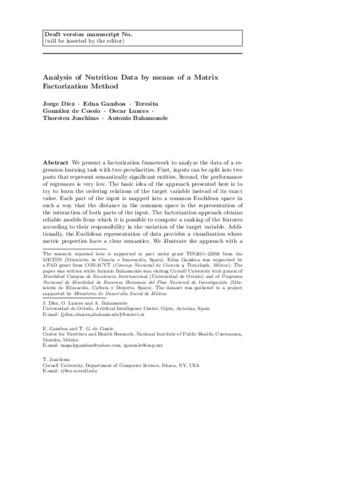Analysis of nutrition data by means of a matrix factorization method
Fecha de publicación:
Editorial:
Springer
Versión del editor:
Citación:
Descripción física:
Resumen:
We present a factorization framework to analyze the data of a regression learning task with two peculiarities. First, inputs can be split into two parts that represent semantically significant entities. Second, the performance of regressors is very low. The basic idea of the approach presented here is to try to learn the ordering relations of the target variable instead of its exact value. Each part of the input is mapped into a common Euclidean space in such a way that the distance in the common space is the representation of the interaction of both parts of the input. The factorization approach obtains reliable models from which it is possible to compute a ranking of the features according to their responsibility in the variation of the target variable. Additionally, the Euclidean representation of data provides a visualization where metric properties have a clear semantics. We illustrate the approach with a case study: the analysis of a dataset about the variations of Body Mass Index for Age of children after a Food Aid Program deployed in poor rural communities in Southern México. In this case, the two parts of inputs are the vectorial representation of children and their diets. In addition to discovering latent information, the mapping of inputs allows us to visualize children and diets in a common metric space
We present a factorization framework to analyze the data of a regression learning task with two peculiarities. First, inputs can be split into two parts that represent semantically significant entities. Second, the performance of regressors is very low. The basic idea of the approach presented here is to try to learn the ordering relations of the target variable instead of its exact value. Each part of the input is mapped into a common Euclidean space in such a way that the distance in the common space is the representation of the interaction of both parts of the input. The factorization approach obtains reliable models from which it is possible to compute a ranking of the features according to their responsibility in the variation of the target variable. Additionally, the Euclidean representation of data provides a visualization where metric properties have a clear semantics. We illustrate the approach with a case study: the analysis of a dataset about the variations of Body Mass Index for Age of children after a Food Aid Program deployed in poor rural communities in Southern México. In this case, the two parts of inputs are the vectorial representation of children and their diets. In addition to discovering latent information, the mapping of inputs allows us to visualize children and diets in a common metric space
Colecciones
- Artículos [37544]
- Informática [875]
Ficheros en el ítem




